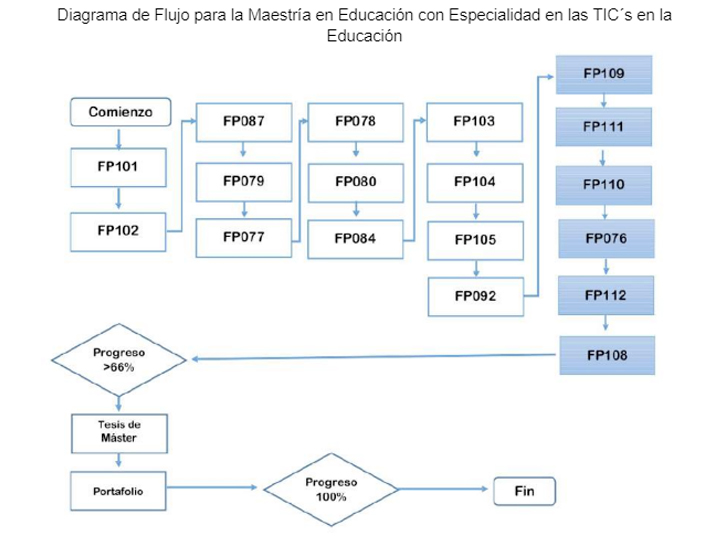
Description
The Master in Education with a specialty in ICT in Education is focused on training the academic staff in a way that the current educative challenges presented in the execution of teaching can be addressed with the support of technologies in the different levels of education. The master aims to offer specialized, updated, and multidimensional didactic education for the selection, design, and application of Information and Communication Technologies from this perspective where quality, creativity, and innovation in favor of educational improvement can be promoted.
Outcomes
General Outcomes
- Offer a wide and updated education, and provide the basis for the development of academic and professional skills needed for teaching in any of the different contexts of teaching-learning that may be given.
- Establish the professional practice in the current knowledge in new or little know environments of education; provide ideas regarding the nature of teaching and learning in general; and develop the necessary competencies, knowledge, skills, and practical resources to complete this theoretical basis.
- Stimulate the critical reflection for a good theoretical education and its necessary practical application, a fundamental field of action; develop good judgment, good decision-making, and problem-solving; and provide tools of scientific investigation for the referenced contribution in innovative or current ICT topics.
Specific Outcomes
By completing this program, students will be able to:
- Analyze the e-learning concept and virtual environments of teaching and learning, and distinguish the different types of virtual environments.
- Identify the characteristics of teaching and learning in virtual learning environments.
- Plan and evaluate learning processes in virtual environments, taking into account the context of teaching-learning, the methodological approach, and the interests, needs, and learning styles of the students.
- Identify and manage the different resources and technological tools from the information and communication technologies.
- Select and apply the different tools and resources in a creative way in the design of pedagogical proposals.
- Identify the main theories of learning applied to ICT.
- Relate the theories of learning with the use, selection, organization, and evaluation of ICT.
- Identify the sociocultural theoretical postulates that establish the collaborative learning in a virtual environment.
- Describe and value the technologies which benefit the collaborative work in virtual environments of teaching-learning.
- Identify the theoretical basis which establishes the innovative educative proposals based on ICT.
- Design and evaluate proposals of education based on ICT.
Target Audience
University graduates in any area of knowledge that are dedicated or wish to work in teaching and want to receive specific and specialized education related to the application of ICT in teaching; design of programs, courses, resources, materials, and learning environments; and training actions in the field of education (formal and informal) or corporate (editorials, multimedia producers, etc.).
Duration
The maximum time available to complete this program is 24 months. The credits structure of the Master in Education with a specialty in ICT in Education is as follows:
Core: 34 credits
Electives: 13 credits
Required: 13 credits
The student will accomplish a minimum of 60 credits.
Structure
| MASTER IN EDUCATION WITH A SPECIALTY IN ICT IN EDUCATION | |||||
|---|---|---|---|---|---|
| CODE | SUBJECT | PREREQUISITE | CREDITS | ||
| CORE | |||||
| FP101 | Learning theories and methodological approaches in education | N/A | 3 | ||
| FP102 | Strategic learning and professional development | N/A | 3 | ||
| FP087 | Learning factors | N/A | 3 | ||
| FP079 | Tutoring action in the education system | N/A | 3 | ||
| FP077 | ICT in classroom. Education applications and use of resources | N/A | 3 | ||
| FP078 | Interculturality and education | N/A | 3 | ||
| FP080 | Conflict solution and transformation in the educational environment | N/A | 3 | ||
| FP084 | Environment education in formal education | N/A | 3 | ||
| FP103 | Fundamentals of special education: Processes of attention to diversity | N/A | 3 | ||
| FP104 | Organization and management of educational centers | N/A | 3 | ||
| FP092 | Methodology of scientific research | N/A | 3 | ||
| FP105 | Portfolio I | N/A | 1 | ||
| ELECTIVES | |||||
| FP109 | ICT in education and learning theories | N/A | 3 | ||
| FP111 | Analysis of technological resources and design of creative activities | N/A | 3 | ||
| FP110 | Training in virtual learning environments | N/A | 3 | ||
| FP076 | Collaborative work in virtual environments | N/A | 2 | ||
| FP112 | Design and evaluation of training proposals based on ICT | N/A | 2 | ||
| REQUIRED | THESIS | ||||
| FP108 | Portfolio II | N/A | 1 | ||
| FP116 | Portfolio III | N/A | 2 | ||
| FPEE01 | Master's Final Project | Must complete 50% of the credits and FP092 | 10 | ||
| TOTAL | 60 | ||||
Diagram

Degree
After approving the courses and the Master's Thesis, and satisfying any other academic, administrative, and economic necessity expected and required by the university, the following degree will be issued:
Master in Education with a specialty in ICT in Education